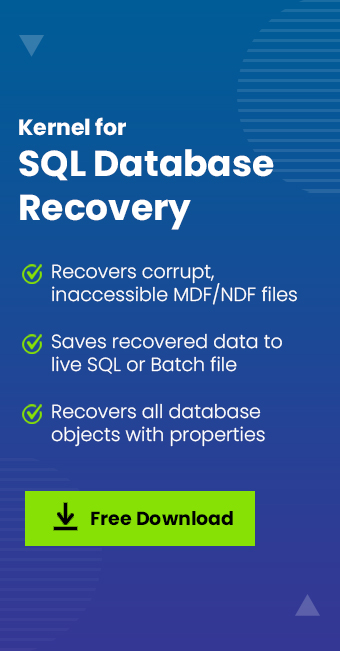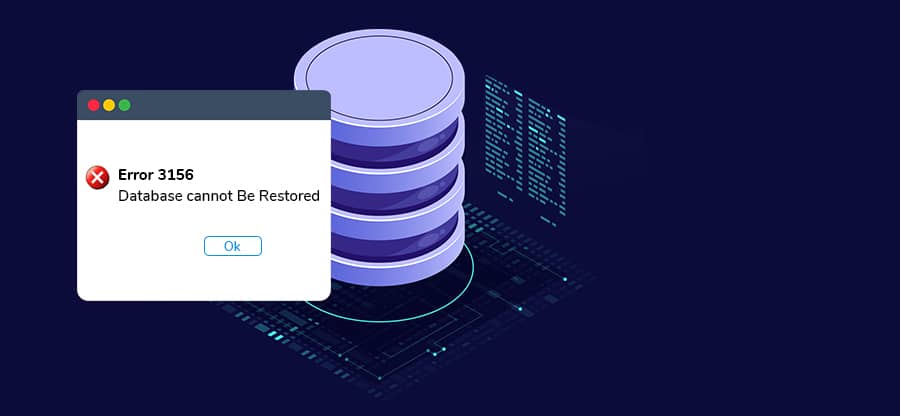Read time: 4 minutes
SQL Server databases are complex systems that require technical expertise to maintain. Error 601 in the SQL Server database can be a complex issue requiring immediate attention to prevent data loss. In this blog, we will discuss practical ways to resolve this error & restore your SQL Server database to its optimal performance.
About the error 601 in SQL Server database
Error 601 in SQL Server Database occurs when a query cannot read data because another transaction has modified or deleted it. This happens when the query uses the NOLOCK locking hint or READ UNCOMMITTED transaction isolation level. The error message indicates that the scan cannot continue due to data movement.
Error Message Text displayed as:
Could not continue scan with NOLOCK due to data movement
Reasons for prevalence of error 601 in SQL Server database
Follow the reasons below that lead to the existence of SQL error 601.
- Dirty reads arise from NOLOCK/UNCOMMITTED.
- Allows data to be read concurrently.
- Transactions not fully committed can change data.
- Error 601 occurs due to data inconsistency.
How to troubleshoot error 601 in SQL Server database?
Here are the easy solutions below to fix error SQL 601 tried and tested by experts.
- Cancel the query
Error 601 in SQL Server commonly occurs due to insufficient memory allocation for a specific query, causing the query execution plan to fail. One solution is to cancel the query & restart the server to free up memory resources. To fix it, cancel the running query in SQL Server Management Studio by pressing the Cancel icon.
Moreover, optimizing the query or increasing server memory can help prevent similar errors from occurring in the future. Always back up your database before making any changes. - Repair the database
Error 601 in SQL Server Database can be frustrating, as it usually indicates a problem with the database itself. But, you can resolve it via various methods, one of which is repairing & restoring the database. This solution easily fixes any kind of damage or repairs SQL corruption in the database.
To check whether the database is corrupt or not, use the DBCC command given below.DBCC CHECKDB (kerneldb) WITH NO_INFOMSGSThis command will execute a check on the database “kerneldb” to determine if it is corrupted or not. As the corruption is confirmed, the next step is to repair the SQL database using the CHECKDB command.
- Using the automated third-party tool
The Kernel for SQL database recovery tool is an advanced automated solution designed to fix Error 601 & other such errors in SQL Server Database. This powerful tool has highly advanced algorithms to repair corrupt SQL database files. It boasts an intuitive user interface & comes equipped with a range of advanced features, including support for all SQL Server versions, multiple recovery modes & the ability to restore both primary as well as secondary database files.With this SQL database recovery tool at your disposal, you can quickly fix Error 601 & restore your SQL Server Database to optimal working condition.
The CHECKDB command has different repair options from repair_allow_data_loss, repair_rebuild to repair_fast.To utilize the CHECKDB command for repairing the corrupted database, type up this given command:
This command will begin your SQL database repair process, where all the corrupted pages will be eliminated from the database. You must use this solution as the last option because it may result in data loss.
Final say
Error 601 is a common SQL Server database error that needs to be fixed at the earliest. It is important to understand the causes behind it & then find the right solution for the same. Since manual methods are complex & tedious, we would also suggest users to utilize the best SQL database repair tools like Kernel for SQL Database Recovery to deal with all such issues related to MS SQL Server databases. Hope these tips have helped shed some light on error 601 & possibly provided the necessary guidance needed to tackle it.







